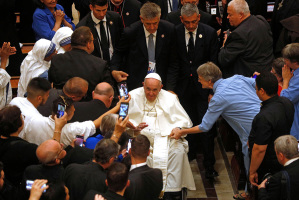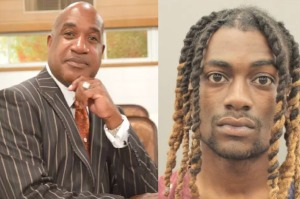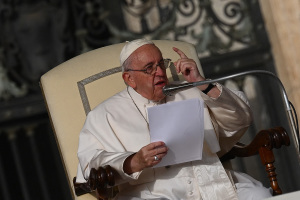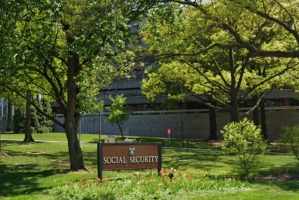Richard Dawkins, the Atheist Who Isn't, but the Episcopal Bishop Who Might Be
Just as the atheist Richard Dawkins discloses he doubts God's non-existence, Richard Holloway, Episcopal Bishop of Edinburgh, asserts his doubt in the Deity's existence.
The atheist and the bishop have wound up at the same place. In the case of the world's most outspoken non-believer, the step is progression, but in the case of the leader in the Scottish Episcopal Church, the step is regression.
"I can't be sure God does not exist," said Dawkins, crusader against belief in God, during a debate with the Archbishop of Canterbury February 24. The next day Holloway was quoted as saying he can't be sure God does exist.
The Scotsman carried a February 25 headline focusing on Holloway, one of Archbishop Rowan Williams' colleagues. The banner in the Scottish newspaper read, "There may be no God, 'but let us live as though there were,' says Bishop Richard Holloway."
Dawkins takes a step away from absolute unbelief, but Holloway continues his race away from faith.
"There was surprise when Prof Dawkins acknowledged that he was less than 100 percent certain of his conviction that there is no creator," wrote John Bingham in The Telegraph. Dawkins told the audience he was "6.9 out of seven" certain of his conviction of God's non-existence.
Sir Anthony Kenny, a philosopher chairing the discussion, hooked on to the nagging tenth of a percent. "Why don't you call yourself an agnostic?" he asked Dawkins, who answered that he does indeed. Kenny was taken aback. "You are described as the world's most famous atheist," he told Dawkins.
Actually, Richard Dawkins has crashed into the massive barrier that makes absolute atheism a logical impossibility. To make a final statement that there is no "something," one must know everything, lest the "something" might exist in that gap of not-knowing, even if it's Dawkins' miniscule tenth of a percent.
For example, I can state as absolute fact there is no asteroid in the universe shaped like a horse's head. However, by the very standards of the science that frames Dawkins' worldview, unless I have observed and measured every asteroid in the cosmos I cannot be completely sure a horse-headed asteroid does not exist.
Give Dawkins credit for acknowledging the impossibility of absolute atheism. The gadfly of that tenth of a percent means Dawkins is a man of faith after all. He prefers to cast his faith on the 6.9 percent, and hope he is right.
But let's go with Dawkins for a moment. As a man who demands scientific precision one must assume that his one tenth of a percent is not hyperbole, but carefully measured probability. If so, his equations must be flawed. Frances Collins, a geneticist and (like Dawkins) evolutionary biologist, who led the project to map the human genome, found through his research that the probability of God's existence was so great he became a believer – a Christian, in fact.
We could cite many more modern philosophers and scientists who discovered that the probability of God's existence was so great it could not be ignored. That list would include Dawkins' fellow countryman Sir Anthony Flew (who also moved from atheism to agnosticism), American mathematician Peter Stoner, Rice University nanotechnologist James Tour, astrophysicist Hugh Ross, and even Albert Einstein, who could not bring himself to the absolutism of atheism.
If Dawkins has thudded into the barrier against atheism, so has Bishop Holloway, though from a different direction. About five years after his ordination, the young priest "went through a phase of very radical doubt indeed," he told The Scotsman interviewer. Finally Holloway "arrived at a way of living within the church and the priesthood, almost as an existential gamble, that if there isn't anything in this, there is certain beauty and courage in living as if it were true."
Dawkins is unwilling to commit to an absolute position that there is no God. Holloway won't bring himself to an absolute assertion there is a God. Who is the more honest in their agnosticism?
It's the former atheist, and here's why: Dawkins concedes that his long journey through atheism has led him to a wall blocking his completion of the trip. To his mind, there's a one-tenth of a percent possibility God may exist just beyond the unscalable barrier.
Apparently, Holloway has not yet realized that his dreamy talk of "certain beauty" and "courage" is meaningless if there is no God. Admirably, no doubt, he stays in the priesthood because part of the "certain beauty" is serving other human beings. One of the greatest barriers to evolutionary atheism is altruism. If only the strongest survive, and the greatest good is the preservation of one's self and species, whence comes this impulse in the human spirit to serve others, even to the point of personal sacrifice? Tomes have been written by atheistic thinkers trying to solve that riddle.
"I contemplated leaving the priesthood," said Holloway, "but struggled on and stayed with it." If there is no God, why? If Holloway's answer for "staying with it" has to do with noble aspirations of love and service, then where is there any possibility for the non-existence of God?
Both Dawkins and Holloway need to come to terms with that faith that is "the substance of things hoped for, the evidence of things not seen." (Hebrews 11:1) Holloway concluded that "there may be no God in the universe, but let's live as though there is, and even if we are wrong it will be a glorious way to be proved mistaken."
Actually, being proved wrong in this case is not "glorious," but terrifying. When a believer dies, if he or she were wrong, that person would never know it. When the person who bet eternity on agnosticism dies and is proven wrong, he or she will know it forever – horribly so, according to the Bible.
To borrow Bishop Holloway's phrase, that's too much an "existential gamble", even for Richard Dawkins' 6.9 percent.





























